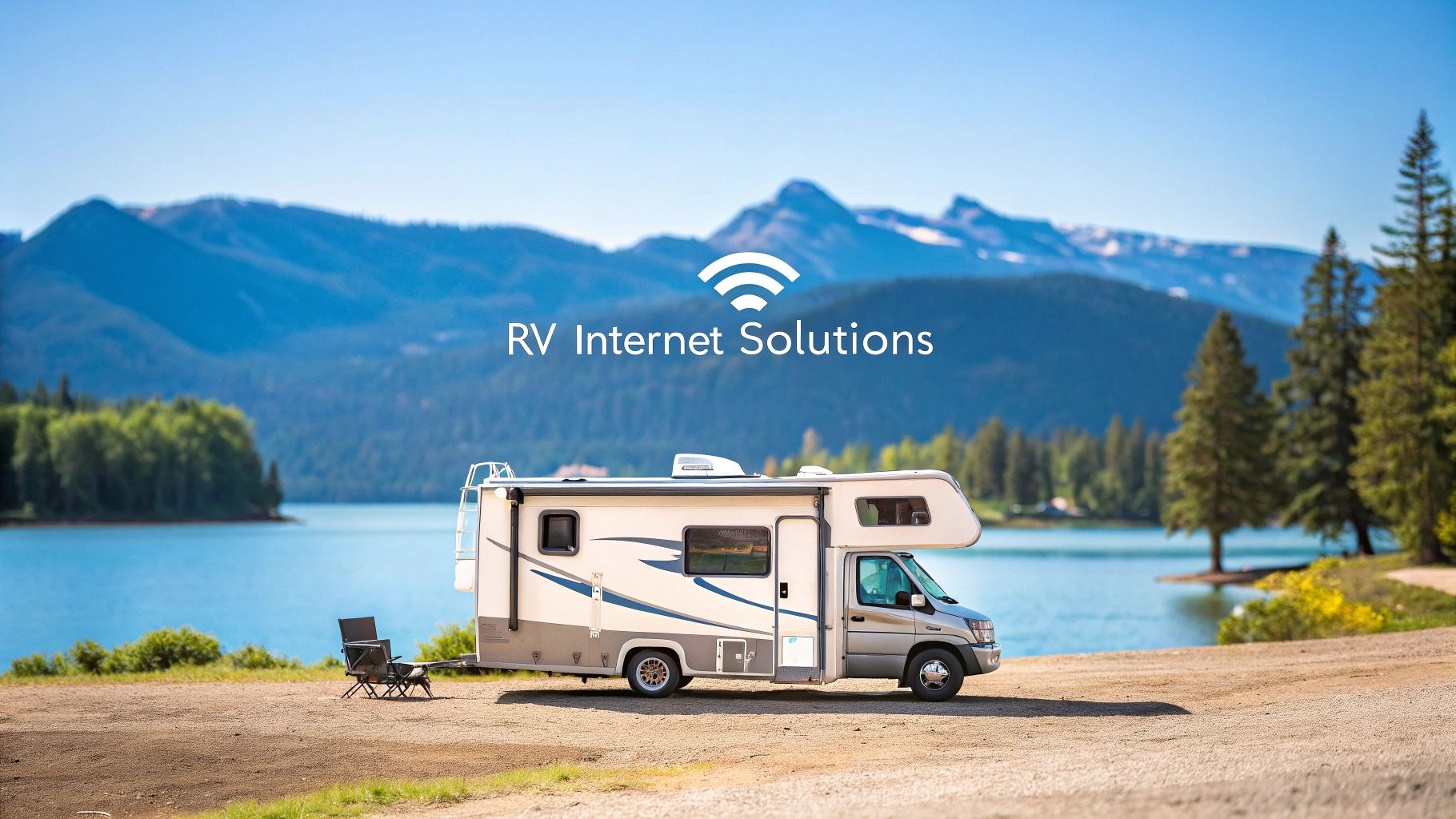

· By James
Top RV Internet Solutions for 2025: Stay Connected on the Road
Hitting the Road, Staying Connected: Your Guide to RV Internet
Finding reliable internet on the road is crucial for modern RVers. This list of top RV internet solutions provides the tools you need to stay connected whether you're working remotely, streaming, or checking in with loved ones. We'll cover eight options in 2025, including cellular plans, mobile routers, and satellite internet, offering solutions for various budgets and needs. Stop struggling with spotty connections and discover the best RV internet solution for you, from SwiftNet Wifi and Starlink to mobile hotspots and signal boosters like the WeBoost Drive X RV.
1. SwiftNet Wifi
SwiftNet Wifi offers a high-speed 5G internet solution specifically designed for rural areas and RV travelers. This makes it an excellent option for those seeking reliable connectivity while on the road or living outside of traditional service areas. Ditching the constraints of campground Wi-Fi and public hotspots, SwiftNet Wifi aims to provide consistent internet access wherever your travels take you. For those working remotely from their RV or needing a dependable connection in a rural home, SwiftNet Wifi presents a compelling alternative to traditional internet providers. It's a strong contender for anyone looking for robust rv internet solutions.
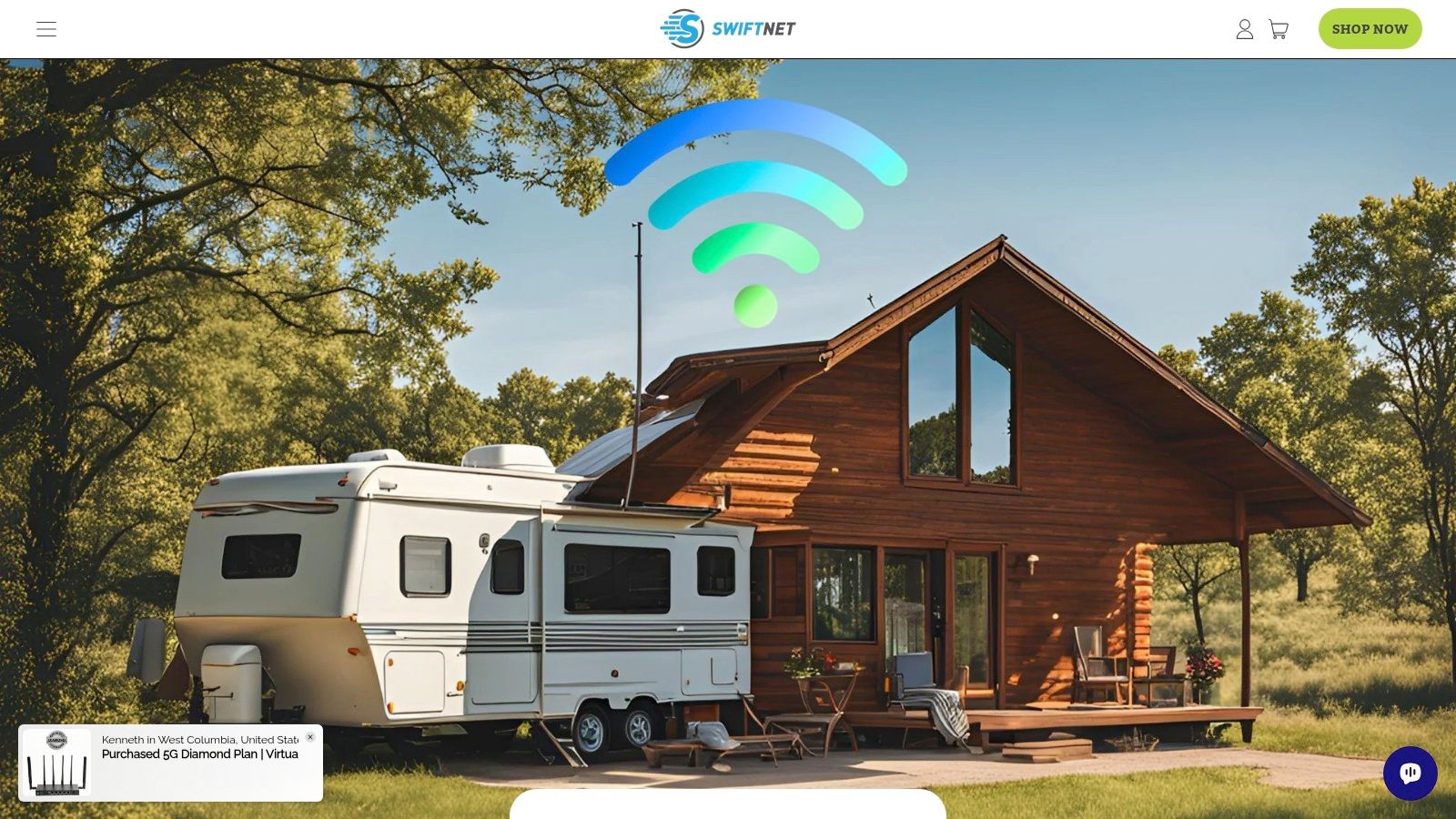
While precise pricing and technical requirements aren't readily available on the main website, their focus on 5G suggests faster speeds and lower latency than older 4G/LTE solutions. This is crucial for activities like streaming, video conferencing, and online gaming, which are often essential for both remote workers and those seeking entertainment on the road. Learn more about SwiftNet Wifi for potentially more in-depth information about their services. Compared to other mobile internet options, SwiftNet Wifi’s targeted focus on rural customers and RV users suggests they likely prioritize coverage and service in areas often neglected by larger providers.
Unfortunately, without more readily available information, it's difficult to provide specific setup tips or compare it feature-by-feature with competitors. However, prospective customers should research 5G coverage in their travel areas or home location. 5G availability can still be patchy, particularly in remote regions. Understanding the potential for coverage gaps will help manage expectations. It would also be beneficial to investigate data limits and potential throttling policies, common considerations for mobile internet plans.
SwiftNet Wifi's dedicated approach to serving the RV and rural communities is why it earns a top spot on this list of rv internet solutions. Further research through their website and direct contact with their sales team will help determine if it's the perfect fit for your specific connectivity needs. Visit their website at https://swiftnetwifi.com for more information.
2. Starlink
For RVers seeking a reliable and fast internet connection, particularly in remote areas, Starlink has quickly become a game-changer. This satellite internet service, powered by SpaceX, offers a viable alternative to traditional RV internet solutions like cellular data and campground Wi-Fi, especially for those who prioritize consistent connectivity for work or entertainment. Its wide coverage area extends even to locations where cell service is nonexistent, making it a top choice for off-grid adventurers. Starlink offers a specific RV internet plan (formerly known as the RV plan, now called Roam) designed for the mobile lifestyle.
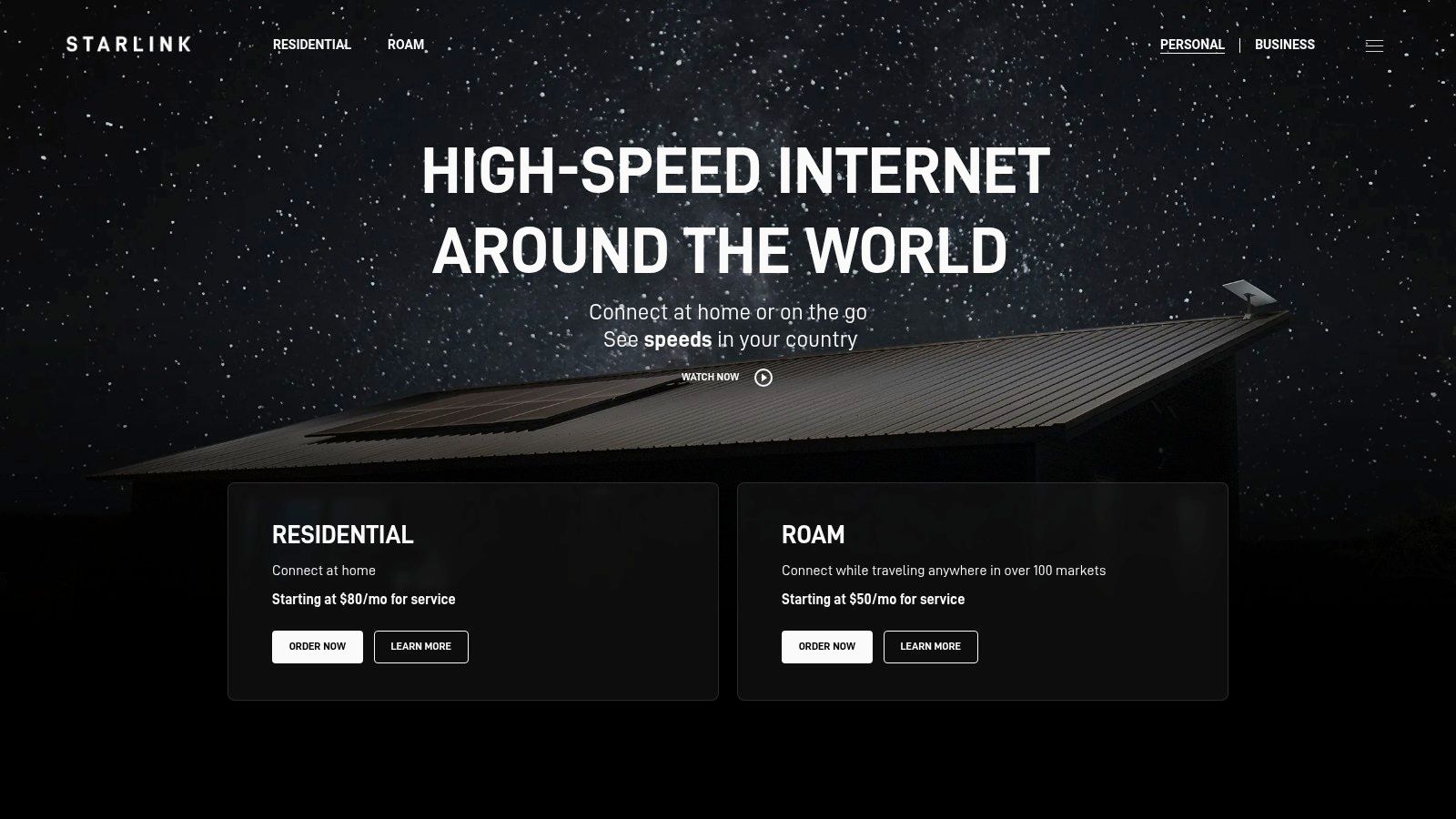
Starlink's Roam plan delivers impressive download speeds between 100-200 Mbps in most locations, with low latency generally ranging from 20-40ms. This performance rivals, and often surpasses, traditional wired connections, making it suitable for demanding tasks like video conferencing, streaming, and online gaming. The portability of the Starlink system is another key benefit for RVers. The Roam plan allows you to use your Starlink anywhere within Starlink's coverage area. For those who require internet access while driving, Starlink offers a premium "in-motion" hardware option, though at a significantly higher cost. This allows for seamless connectivity even on the go, transforming the RV into a truly mobile office or entertainment center.
The setup is remarkably simple, requiring minimal technical expertise. The Starlink kit comes with everything you need, including the dish, router, and cables. Simply connect the dish, plug in the router, and download the Starlink app to manage your connection. This ease of use makes it particularly appealing for those who aren't tech-savvy. Starlink operates on a flat monthly fee with no long-term contracts, offering flexibility for RV travelers who may need to pause their service during periods of non-use. This pay-as-you-go model makes it a cost-effective solution for those who aren't full-time RVers.
Pros:
- Remote Coverage: Works even where cell service and traditional internet providers don't reach.
- No Data Caps: Enjoy unrestricted data usage on standard plans.
- Easy Setup: Simple installation and user-friendly interface.
- Pause Service: Flexibility to suspend service and save money when not traveling.
- Fast Speeds & Low Latency: Excellent performance for streaming, gaming, and working remotely.
Cons:
- High Upfront Cost: The hardware cost ($599 for standard, $2,500 for in-motion) can be a significant investment.
- Obstructions: Performance can be affected by trees, buildings, or other physical barriers that obstruct the dish's view of the sky.
- Clear Sky Required: Cloudy or stormy weather can sometimes impact the connection quality.
- Power Consumption: The system consumes 50-75W, which can be a concern for boondocking with limited power resources.
Website: https://www.starlink.com
Starlink earns its place on this list of RV internet solutions due to its ability to provide reliable, high-speed internet in locations where other options fail. While the upfront cost is higher than other solutions, the performance and convenience, particularly for those prioritizing remote work or off-grid living, make it a worthy investment for many RVers. It's an essential tool for anyone looking to stay connected while exploring the open road.
3. Verizon 5G Home Internet
Verizon 5G Home Internet and its LTE Home Internet counterpart present a compelling rv internet solution for those seeking connectivity on the go. While not specifically designed for mobile use, its flexibility and Verizon's expansive network make it a popular choice amongst RVers. This solution leverages Verizon's existing cellular infrastructure, offering a practical alternative to traditional wired internet options, especially in areas where fiber optics or cable internet isn't available. This makes it a viable option not just for RVers, but also for those living in rural areas or anyone seeking a reliable internet connection for remote work while traveling.
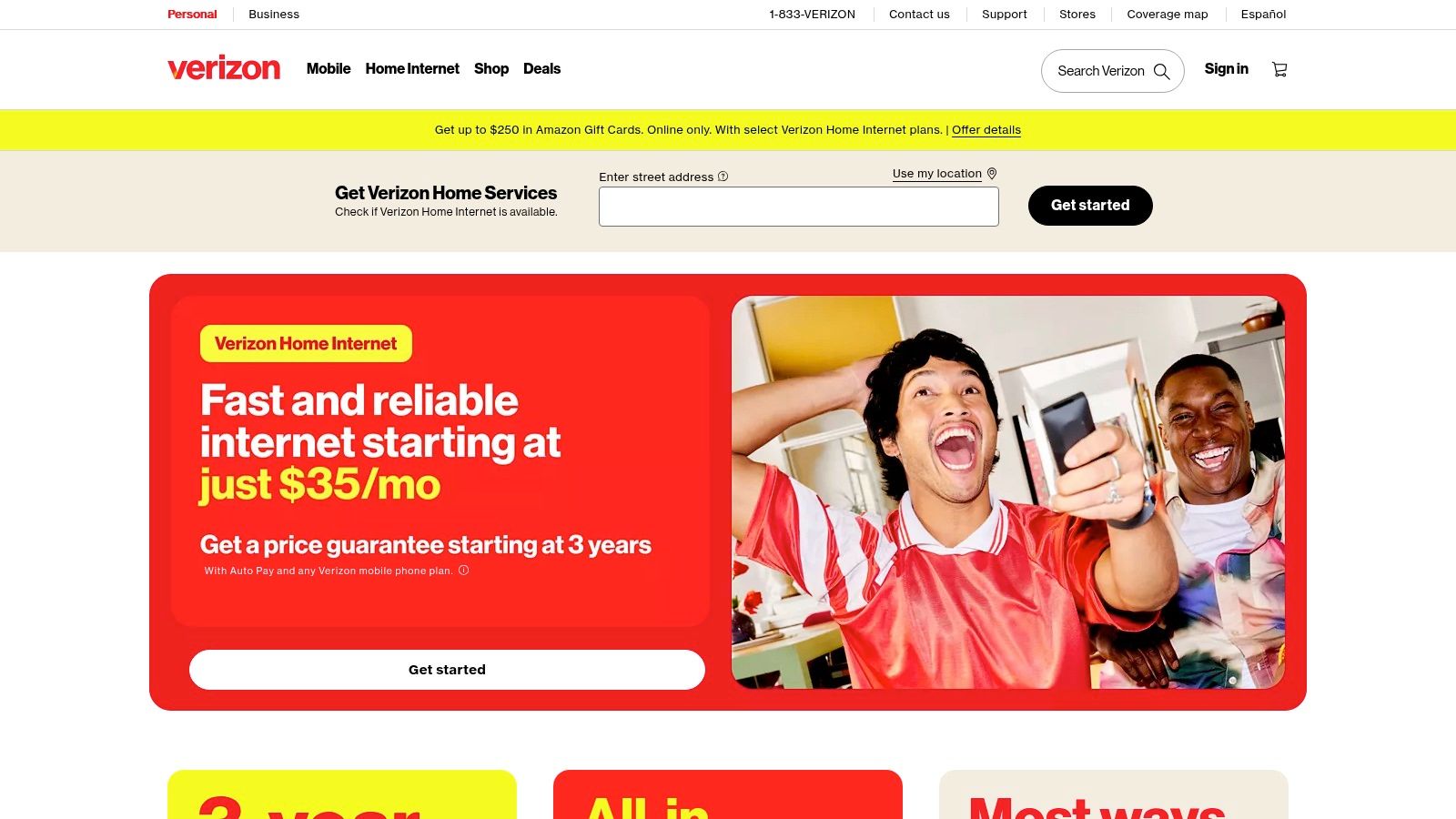
The key to successfully using Verizon Home Internet in an RV lies in the right equipment. You'll need a compatible cellular router that can connect to Verizon's network and broadcast a Wi-Fi signal within your RV. Boosters can also significantly enhance the signal strength, especially in areas with weaker coverage. This setup allows you to connect multiple devices within your RV, just like a traditional home network. While Verizon offers its own router, many RVers opt for aftermarket routers and boosters for greater control and customization. This is particularly important for those prioritizing signal optimization in varying locations.
Verizon offers multiple plan options, including prepaid plans, which provide flexibility for RVers. The availability of unlimited data on most plans is a major draw, especially for those who rely heavily on internet access for work or entertainment. Download speeds vary from 25-300 Mbps depending on location and network congestion. This variability is a key consideration. While you might experience excellent speeds in areas with strong 5G Ultra Wideband coverage, performance can dip significantly in areas with only 4G LTE or weaker 5G signals.
Pros:
- Strong coverage across much of the United States, making it a reliable option for cross-country travel.
- Reliable service in areas with a good Verizon signal.
- Flexible plan options, including unlimited data plans, catering to various usage needs.
- No contracts on prepaid plans, offering flexibility for seasonal RVers.
Cons:
- Performance varies greatly by location and can be significantly impacted by network congestion.
- May experience throttling during peak usage periods in congested areas.
- Not officially supported for mobile use, meaning troubleshooting can sometimes be challenging.
- Can be expensive for high-data users, particularly if relying solely on the premium unlimited data plans.
Pricing and Technical Requirements:
Pricing for Verizon 5G Home Internet and LTE Home Internet varies depending on the plan and location. Check the Verizon website for the most up-to-date pricing information. Technically, you’ll need a compatible 5G or LTE router and potentially an external antenna or booster for optimal performance.
For RVers seeking a robust rv internet solution, Verizon's offerings provide a compelling option, leveraging its extensive network. However, it's crucial to understand the limitations and potential performance variations based on location. Researching coverage in your planned travel areas and investing in appropriate equipment are essential for a positive experience. You can explore the available plans and learn more on their website: https://www.verizon.com/home/internet/
4. T-Mobile Home Internet
T-Mobile Home Internet is emerging as a popular rv internet solution, particularly for those prioritizing unlimited data and a simple setup. While designed for stationary homes, its flexible nature and growing rural network coverage make it an attractive option for many RV travelers seeking reliable internet access on the road. This solution deserves a place on this list due to its competitive pricing, truly unlimited data, and ease of use, making it a strong contender amongst other rv internet solutions.
T-Mobile Home Internet utilizes T-Mobile's cellular network to deliver internet connectivity. This means your RV's internet performance will depend on the strength of the T-Mobile signal at your location. The service includes a Nokia 5G gateway device which receives the cellular signal and broadcasts a Wi-Fi network within your RV.
Features and Benefits:
- Speed: Download speeds typically range from 25-200 Mbps, depending on location and network congestion. While not as consistently fast as some Starlink plans, these speeds are sufficient for streaming, video conferencing, and most online activities.
- Unlimited Data: A key advantage of T-Mobile Home Internet is its truly unlimited data policy on their home internet plans. Unlike some other "unlimited" plans that throttle speeds after a certain threshold, T-Mobile Home Internet doesn't impose hard data caps or throttling, making it ideal for high-bandwidth users.
- Pricing: T-Mobile Home Internet offers a simple, flat-rate pricing structure of around $50/month with autopay. This predictable cost makes budgeting for internet on the road much easier.
- No Contracts: The absence of contracts provides flexibility for RVers who may only need the service seasonally or during specific trips.
- Rural Network Expansion: T-Mobile is actively expanding its rural network coverage, making this an increasingly viable option for those venturing off the beaten path.
Pros:
- Truly unlimited data with no throttling on home internet plans. This is a huge advantage for those who stream movies, work remotely, or rely on data-intensive applications.
- Affordable flat monthly rate ($50/month with autopay). This makes it a budget-friendly choice compared to some other rv internet solutions.
- No contracts required, providing flexibility for travelers.
- Strong performance in urban and many suburban areas.
Cons:
- Coverage can be spotty in some rural areas, though this is continually improving. Checking coverage maps before your trip is crucial.
- Not officially supported for mobile use. While many RVers use it successfully on the road, T-Mobile doesn't officially support mobile usage of their Home Internet service.
- May need to use third-party equipment for better reception in an RV. External antennas and cellular signal boosters can significantly improve connectivity, especially in fringe coverage areas. Consider investing in these tools for a more consistent connection.
- Service address changes may require customer service interaction. Although some users report success with simply moving the device, officially, you may need to contact customer support to update your service address when moving frequently.
Implementation/Setup Tips:
- Check Coverage: Before subscribing, meticulously verify T-Mobile's coverage at your intended destinations using their official coverage map. Consider supplementing this with online forums and resources where RVers share their experiences with T-Mobile Home Internet in specific locations.
- Consider a Signal Booster: Invest in a high-quality cellular signal booster and external antenna to improve reception, especially in rural areas. This can significantly impact your connection speed and reliability.
- Manage Expectations: While performance is generally good in urban and suburban areas, understand that speeds and reliability can fluctuate in rural locations.
Website: https://www.t-mobile.com/home-internet
T-Mobile Home Internet presents a compelling option for RV travelers seeking a good balance of cost, performance, and unlimited data. By understanding its limitations and employing strategies to optimize connectivity, this service can be a valuable tool for staying connected on the road. It’s a valuable rv internet solution worthy of consideration, especially for those prioritizing unlimited data and a simple setup.
5. Peplink MAX Transit
For RV travelers seeking the most robust and reliable internet connectivity on the road, the Peplink MAX Transit is a top contender among RV internet solutions. This premium mobile router is designed specifically for vehicles and offers advanced features that go beyond basic Wi-Fi hotspots. Its ability to connect to multiple cellular carriers simultaneously, combined with its failover capabilities, ensures you stay connected even in areas with spotty coverage. This makes it a particularly compelling solution for those who work online remotely from their RV or rely heavily on internet access for entertainment and communication.

The MAX Transit supports dual cellular modems, allowing you to insert SIM cards from different carriers and leverage their combined bandwidth. Peplink's proprietary SpeedFusion technology bonds these multiple connections, not only increasing speed but also providing crucial redundancy. If one connection drops, the others seamlessly take over, minimizing interruptions. Beyond cellular, the MAX Transit also features Wi-Fi as WAN, enabling you to connect to campground Wi-Fi or other public networks when available. This flexibility is a significant advantage for RV travelers who encounter varying internet infrastructure on their journeys. Advanced security features, including VPN support, add an extra layer of protection for your online activities. Its rugged design is built to withstand the rigors of mobile applications, ensuring reliable performance even on bumpy roads.
The Peplink MAX Transit offers enterprise-grade reliability and performance, making it a favorite amongst serious RV users. The automatic failover between connection types is a major selling point, ensuring a consistent online experience. For power users, the device is highly configurable, offering granular control over network settings. Peplink also boasts excellent technical support and an active user community, providing valuable resources for troubleshooting and optimization. Learn more about Peplink MAX Transit
However, this premium performance comes at a premium price. The MAX Transit typically costs between $700 and $2000, depending on the specific model and configuration. Configuring the advanced features can also present a steep learning curve for less tech-savvy users. Keep in mind that you'll need separate cellular data plans for each SIM card used, adding to the ongoing cost. Finally, the MAX Transit's advanced capabilities result in higher power consumption compared to simpler RV internet solutions.
Despite the higher cost and complexity, the Peplink MAX Transit provides an unparalleled level of connectivity and reliability for RV travelers who demand always-on internet access. For those who work remotely, rely on streaming services, or simply want the peace of mind of a robust internet connection, the MAX Transit can be a worthwhile investment. Visit the official website for detailed specifications and configuration options: https://www.peplink.com/products/max-transit/
6. Nomad Internet
Nomad Internet is a popular choice among RVers seeking reliable internet access on the road. This service provider specifically caters to the needs of mobile and rural internet users, offering a variety of plans that leverage the major cellular carriers' networks (T-Mobile, AT&T, and Verizon). They understand the unique challenges of maintaining a consistent connection while traveling, making them a strong contender for a solid RV internet solution. Unlike grappling with individual carrier plans and hardware compatibility, Nomad Internet simplifies the process with pre-configured equipment and dedicated customer support familiar with the needs of RV users.
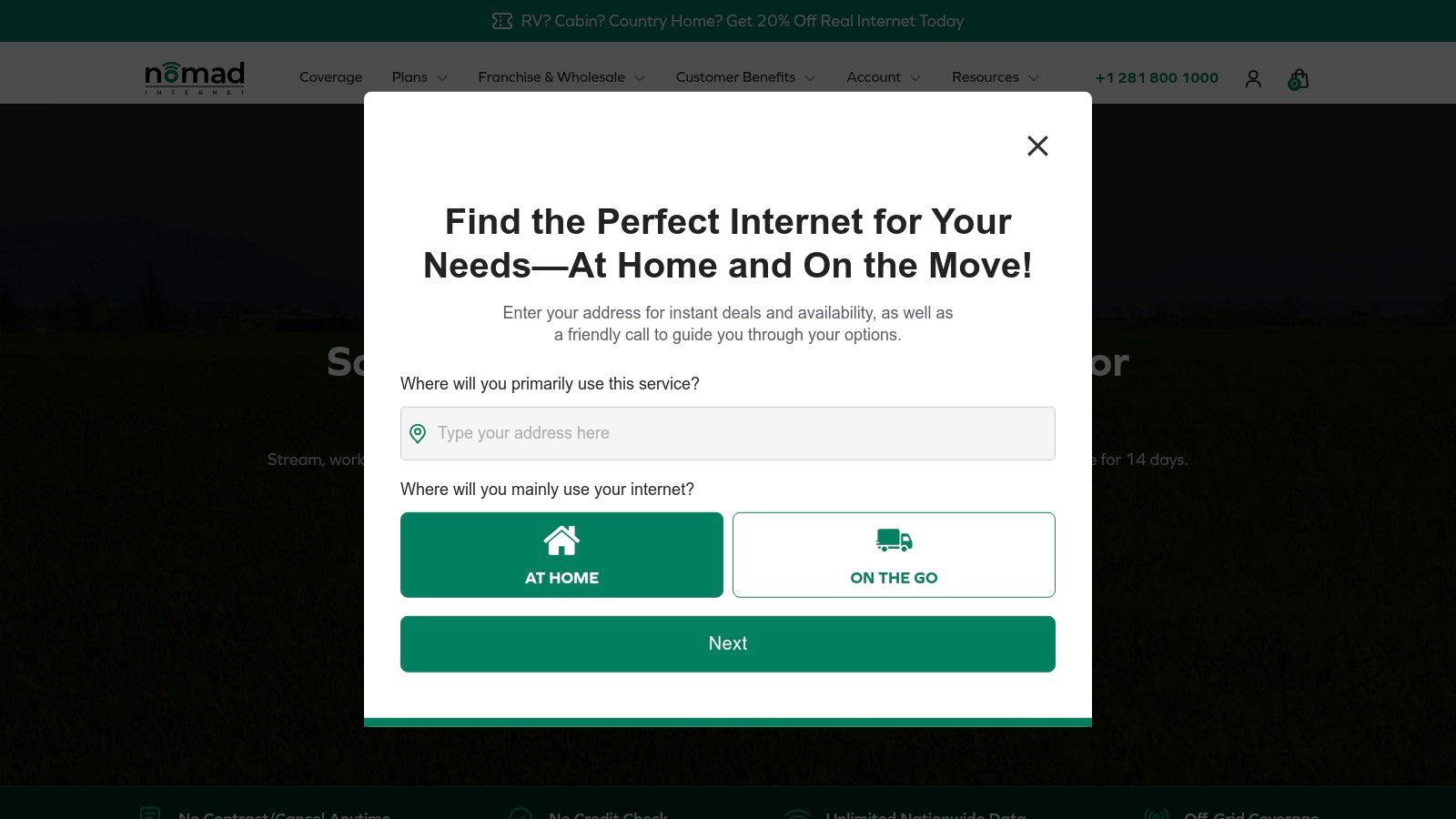
One of the key advantages of Nomad Internet is its flexibility. They offer various data plans, including unlimited options, allowing you to choose the plan that best suits your usage needs. You can also choose to rent or purchase equipment, providing flexibility for both short-term and long-term RV internet solutions. Most plans are contract-free, giving you the freedom to adapt your service as your travel plans change. This is particularly beneficial for those who travel seasonally or are just beginning the full-time RV lifestyle.
For those living in rural areas or working remotely from their RV, Nomad Internet can provide a critical connection. Their multiple network options allow you to select the best coverage for your specific travel areas, minimizing connectivity issues and maximizing productivity. The pre-configured equipment simplifies setup, eliminating the technical hurdles often associated with mobile internet solutions. Instead of spending hours troubleshooting connections, you can quickly get online and focus on enjoying your RV travels.
However, it’s important to consider the potential drawbacks. Nomad Internet is generally more expensive than purchasing a plan directly from a carrier. While the convenience and specialized support justify the premium for some, budget-conscious RVers may want to explore alternative options. Some Nomad Internet plans have soft data caps, meaning your speeds may be throttled after reaching a certain usage threshold. While they offer “unlimited” data plans, these are subject to network management practices, and speeds can vary. Finally, while the company aims to provide excellent customer support, reviews on response times are mixed. It's crucial to read the terms of service carefully as they can change based on evolving carrier policies.
Pricing: While specific pricing isn't readily available without visiting the Nomad Internet website, expect costs to be higher than standard carrier plans due to the included hardware, support, and network aggregation services.
Technical Requirements: Nomad Internet provides the necessary equipment, which typically includes a cellular modem and router pre-configured for their service. You simply need to power on the device and connect your devices to the Wi-Fi network.
Comparison: Compared to other mobile internet solutions like mobile hotspots or using your smartphone as a hotspot, Nomad Internet offers potentially stronger and more consistent connectivity, particularly in rural areas. However, it's crucial to compare the coverage maps and plan features to ensure it aligns with your specific needs and travel routes.
Implementation Tip: Before committing to a plan, contact Nomad Internet and discuss your typical travel areas to ensure they can provide reliable coverage in those locations. Utilize online resources and forums to research user experiences and current performance reviews.
Website: https://nomadinternet.com/
7. WeBoost Drive X RV
The WeBoost Drive X RV is a powerful tool in the arsenal of any RV traveler seeking reliable internet access. It's not an internet solution in itself, but rather a cellular signal booster designed specifically for recreational vehicles. This means it takes existing weak cellular signals and amplifies them, dramatically improving data speeds and call quality in areas with spotty coverage. This is particularly beneficial for those working remotely from their RV, relying on mobile hotspots for internet access, or simply wanting to stay connected in remote locations. The system comprises an external antenna to capture the weak signal, an amplifier to boost it, and an internal antenna to rebroadcast the strengthened signal within your RV. This allows multiple devices to benefit from the boosted signal simultaneously.
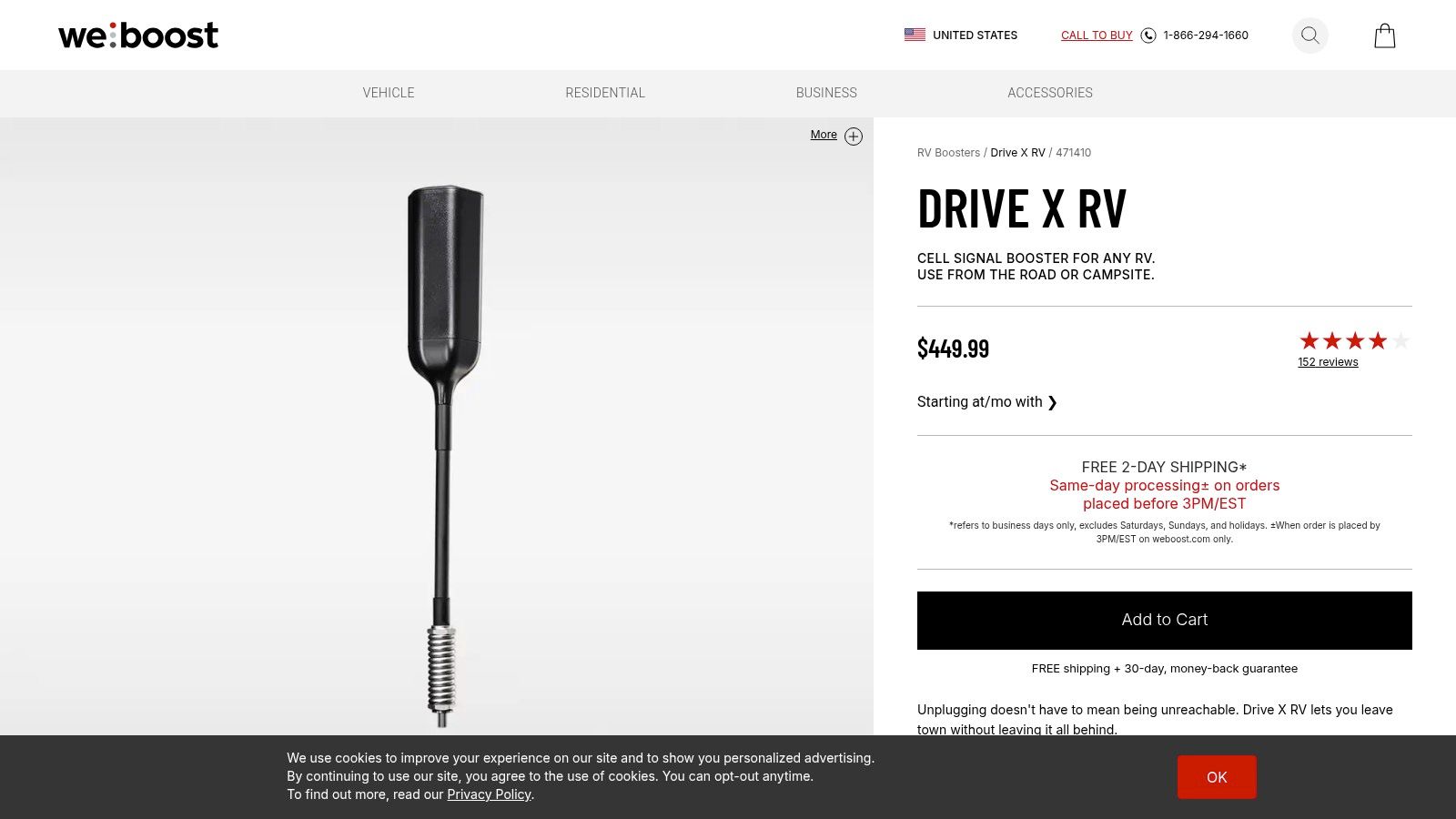
The WeBoost Drive X RV boasts several impressive features, including boosting 4G LTE and 5G signals for all US carriers, offering up to 50 dB signal gain, and providing a maximum coverage area of up to 1,500 square feet. It comes with RV-specific mounting hardware, ensuring a secure and stable installation. Importantly, it’s FCC certified and carrier approved, giving you peace of mind regarding legality and compatibility. For those struggling to find stable internet access while on the road, the WeBoost Drive X RV can be a game-changer, turning a weak and unusable signal into a strong and reliable connection. Learn more about WeBoost Drive X RV
One of its biggest advantages is that it works with all carriers simultaneously, eliminating the need to switch providers based on location. As a one-time purchase with no monthly fees, it provides a cost-effective long-term solution for boosting your rv internet solutions compared to subscribing to multiple services or paying for premium data plans. While other cellular boosters exist, the WeBoost Drive X RV is specifically designed for RV installation and use, making it a top contender in this category.
However, there are some drawbacks to consider. The upfront cost is significant, with an MSRP of $499.99. It's crucial to remember that it amplifies existing signals; it cannot create a signal where none exists. Proper installation is vital for optimal performance, and the external antenna may require periodic adjustment, especially when moving between locations. Despite these cons, the benefits for RV travelers seeking reliable internet access in areas with marginal coverage are undeniable. It provides a significant boost to existing signals, offering a practical solution for maintaining connectivity and accessing critical rv internet solutions while on the road. For those working remotely, staying in touch with family, or simply needing to stay connected, the WeBoost Drive X RV can be a worthwhile investment. You can find more information and purchase the WeBoost Drive X RV on their website: https://www.weboost.com/products/drive-x-rv
8. NETGEAR Nighthawk M5 Mobile Router
The NETGEAR Nighthawk M5 Mobile Router is a powerful and versatile solution for RVers seeking reliable internet access on the go. This portable 5G/4G LTE mobile router leverages cellular networks to provide high-speed connectivity, making it an excellent choice for those who prioritize a simple, all-in-one RV internet solution. It’s designed for easy setup and use, even for those with minimal technical expertise, which is a huge plus for anyone more interested in exploring than troubleshooting their internet connection.
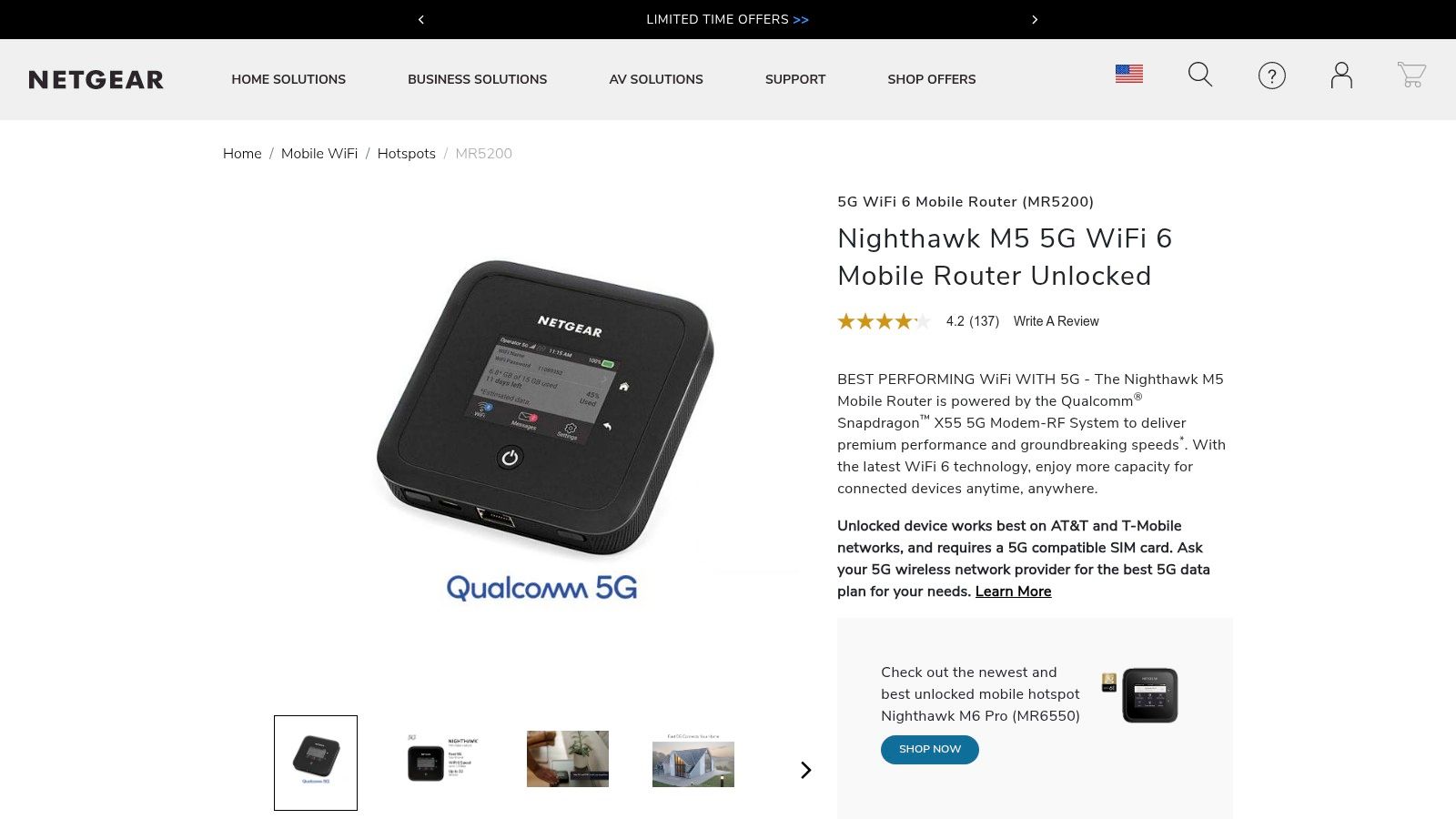
The Nighthawk M5 truly shines in its ability to provide a robust Wi-Fi network within your RV. Supporting Wi-Fi 6 technology, it can handle up to 32 connected devices simultaneously, catering to everyone's online needs, from streaming movies to attending video conferences. This makes it ideal for families or groups traveling together. Its compact and portable design makes it easy to stow away when not in use and its built-in battery offers up to 13 hours of operation on a single charge, providing internet access even when you're off-grid. The intuitive touchscreen interface simplifies management, allowing you to quickly monitor data usage, connect devices, and adjust settings. Furthermore, the inclusion of an Ethernet port provides flexibility for connecting wired devices like gaming consoles or even an external router for more advanced network configurations.
For RVers navigating areas with weak cellular signals, the Nighthawk M5’s compatibility with external antennas is a game-changer. By connecting an external antenna, you can significantly boost signal strength and improve internet speeds, ensuring a consistent connection even in remote locations. This feature solidifies the Nighthawk M5 as a valuable tool for those exploring off-the-beaten-path destinations. This makes it a strong contender against other RV internet solutions like satellite internet, which can be more complex to set up and more susceptible to weather interruptions.
While the Nighthawk M5 is a premium device with a price tag of approximately $700-800, its convenience and performance justify the investment for many RV travelers. It's important to consider the ongoing cost of a data plan as well. One potential drawback is its single carrier limitation, requiring users to swap SIM cards if switching providers. Also, while the battery life is respectable, heavy users may find themselves needing to recharge during the day. Finally, compared to dedicated routers, the Nighthawk M5 offers fewer advanced routing features.
Implementation Tips:
- Purchase a data plan: Before hitting the road, research and select a data plan that aligns with your usage needs. Consider factors like data limits, speed, and coverage area.
- Optimize battery life: Extend battery life by dimming the touchscreen, disabling unused features, and connecting fewer devices when possible.
- Explore external antenna options: If you frequently travel to areas with weak cellular signals, invest in a compatible external antenna for improved reception.
For those seeking a reliable, user-friendly, and portable RV internet solution, the NETGEAR Nighthawk M5 Mobile Router is a top contender. Its combination of high-speed connectivity, Wi-Fi 6 capabilities, and intuitive design makes it a worthy investment for enhancing your online experience on the road. You can find more information and purchase the Nighthawk M5 on the official NETGEAR website: https://www.netgear.com/home/mobile-wifi/hotspots/mr5200/
Top 8 RV Internet Solutions Comparison
| Provider | Core Features/Speed | User Experience/Quality ★ | Value Proposition 💰 | Target Audience 👥 | Unique Selling Points ✨ |
|---|---|---|---|---|---|
| 🏆 SwiftNet Wifi | 5G internet tailored for rural & RVs | Reliable rural coverage ★★★★☆ | Competitive pricing 💰💰 | Rural residents & RV travelers 👥 | Designed specifically for rural & mobile use ✨ |
| Starlink | 100-200 Mbps, low latency (20-40ms) | High-speed, easy setup ★★★★☆ | High upfront cost 💰💰💰 | RVers & remote users 👥 | In-motion hardware option, wide satellite coverage ✨ |
| Verizon 5G Home Internet | 25-300 Mbps, unlimited data | Coverage varies ★★★☆☆ | Flexible plans, but can get pricey 💰💰 | Home users & some RVers 👥 | Nationwide cellular network, no contracts on prepaid plans ✨ |
| T-Mobile Home Internet | 25-200 Mbps, truly unlimited data | Affordable & straightforward ★★★★☆ | Flat rate ~$50/mo 💰 | Urban, suburban & some RV users 👥 | Unlimited data, growing rural network coverage ✨ |
| Peplink MAX Transit | Dual modems, SpeedFusion for failover | Enterprise-grade, advanced ★★★★★ | Premium device cost 💰💰💰 | Power users, RV & mobile professionals 👥 | Multi-carrier simultaneous connection, rugged design ✨ |
| Nomad Internet | Multi-carrier plans, no contracts | Mobile-focused support ★★★☆☆ | More expensive than carriers 💰💰 | Full-time RVers & mobile users 👥 | Purpose-built mobile plans with dedicated service ✨ |
| WeBoost Drive X RV | Signal booster up to 50 dB gain | Improves weak signal areas ★★★★☆ | One-time purchase $500+ 💰 | RV users in marginal coverage 👥 | Amplifies all US carriers, RV-specific design ✨ |
| NETGEAR Nighthawk M5 Mobile | 5G/LTE, Wi-Fi 6, battery powered | Portable & easy ★★★★☆ | High device cost 💰💰 | Traveling RV users & portable needs 👥 | Battery powered, Wi-Fi 6, touchscreen interface ✨ |
Choosing the Right RV Internet Solution for Your Adventures
Finding reliable internet access on the road can be a challenge, but with the right tools, it's entirely manageable. This article has explored a variety of rv internet solutions, from satellite internet options like Starlink and Nomad Internet, to cellular-based solutions like Verizon 5G Home Internet and T-Mobile Home Internet, and even versatile mobile routers like the Peplink MAX Transit and NETGEAR Nighthawk M5. We've also looked at boosting cellular signals with options like the WeBoost Drive X RV. Each of these tools offers unique advantages and caters to different needs and budgets.
The most important takeaways when choosing your ideal rv internet solution are to carefully consider your data usage requirements, your budget, and the typical locations you'll be traveling to. Some solutions are better suited for remote areas, while others excel in areas with strong cellular coverage. Once you've chosen your ideal RV internet setup, make sure you're equipped to maximize productivity on the road. Check out this helpful guide on how to work remotely from deskhop for proven tips on succeeding in a mobile work environment.
Hitting the open road shouldn't mean disconnecting from the world. With careful planning and the right tools, you can enjoy the freedom of RV travel while staying connected. For a simplified and reliable RV internet solution, consider SwiftNet Wifi. SwiftNet Wifi offers flexible data plans and dedicated support to keep you connected wherever your adventures take you.

